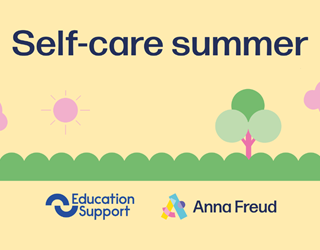Time to Talk Day
Time To Talk Day is on the 2nd of February and aims to inspire conversations about mental health across the UK.
Articles / 3 mins read

Whether you’re concerned about a colleague, friend or family member, or your own mental health and wellbeing, there is plenty you can do to get involved. It doesn’t have to be at an event or a big deal – the small things are often the ones that make the most difference:
Check-in with yourself
Assessing your headspace is a great step to take on Time To Talk Day, as it’s a way to take stock of your wellbeing and be honest with yourself if you need support. You can also take a look at our free downloadable resources on the Education Support website to help you.
Here are some other symptoms you may experience or notice when you are struggling with your mental health:
- Sudden insomnia or sleep disturbance
- Reduced energy and motivation
- Feeling withdrawn
- Sudden weight or appetite changes
- Anxious or fearful feelings
- A sense of hopelessness or being a burden
- Increase alcohol consumption
Get talking about it
Talking more openly to others about how you’re feeling may feel uncomfortable at first – especially if you’re not used to showing a more vulnerable side. Start by taking small steps until your confidence grows and try different approaches until you find what works best for you. At first it might be useful to write down your feelings before a conversation or you could try booking in a specific time to talk.
If you’re unsure how to approach a colleague you could:
- Invite them for a walk – small talk can be very telling.
- Ask them to join you for a coffee or lunch – companionship can help someone feel less of a burden.
- Send an email – if you’re shy or want to keep it private, emails or texts are a great way to get in touch.
- Put up a poster at work or school – the visual reminder can help reduce stigma and encourage talking.
Look to your community
Many communities host walks or meet-ups around Time To Talk Day to connect people and generate that feeling of community support. Exercise can feel like a chore if you’re mental health is declining, and you may lack the energy or motivation, but group activities like this aim to make it fun and less of a burden. Exercise also increases feel-good hormones and can help shift focus away from worries.
Start early
You can encourage openness about mental health and wellbeing by talking to children and young people from an early age.
Why not try a quiz of true or false or you could create a lesson plan that includes reading books about how to be healthy, or display helpful posters in your classroom. Introducing young people to the concept of mental health from an early age can set them up to be more compassionate and aware people as they grow and can help remove stigma.
To help you start, here are some conversation tips:
Whatever you choose to do to get involved, just remember it’s all about talking. Whether you’re expressing concern, asking for help or just talking things over with others, the idea is to make talking about our mental health a more accepted part of life.
- Think of open questions (try not to ask leading questions if possible)
- Actively listen to the answers you get
- Consider the time and place
- Don’t try to force solutions
- Don’t change how you treat them
- Practice being patient
Talk to us
If you need to talk then we’re here for you 24/7. Anyone working in education can call our free and confidential helpline on 08000 562 561 and speak to a qualified counsellor. Call us, we’ll listen.
Don’t wait for a crisis to call.
We’ll offer you immediate, emotional support.
08000 562 561

Sign up to our newsletter for the latest mental heath and wellbeing resources, news and events straight to your inbox.





















